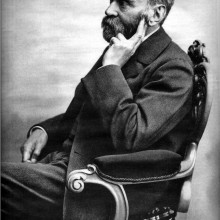This week, the Nobel Prizes for medicine, physics and chemistry were awarded. Here's your quickfire science on the life of the prize's founder, Alfred Nobel, and past recipients of the award with Matt Burnett and Simon Bishop.
In this episode

00:00 - What is the history of the Nobel Prizes?
What is the history of the Nobel Prizes?
This week, the Nobel Prizes for medicine, physics and chemistry were awarded. Here's your quickfire science on the life of the prize's founder, Alfred Nobel, and past recipients of the award with Matt Burnett and Simon Bishop...
- Alfred Nobel was born in 1833. He is best known for inventing dynamite, but his scientific interests were very wide. In fact, he has 355 patents to his name.
- Despite his influence, Alfred Nobel never went to university or obtained a degree.
- When he died in 1896, Alfred Nobel's will instructed his wealth to be used to award prizes to people who have 'conferred the greatest benefit to mankind' in medicine, physics, chemistry, literature and towards 'fraternity between nations' - that's the peace prize to you and me.
- This didn't go down well with his family, who opposed the prize fund. It took five years for the first prize to be awarded.- It is often suggested that the prize was founded because Nobel felt guilty about his work on dynamite. In fact, he thought that the power of dynamite might end all wars for good.
- Today the prize money varies every year. This year's Physics award was £775,000, but for scientists it is really about the prestige.
- In 1915, at the tender age of 25, Lawrence Bragg became the youngest winner. He shared the Prize in Physics with his father, William.
- Many families of brilliant scientists have won more than one prize. The extended Curie family, including Marie Curie and her children's families, have won four.
- The oldest winner to date was the Russian economist Leonid Hurwicz. He was 90 when he collected the prize in 2007, and died less than a year later.
- Only 43 women have been awarded a Nobel Prize, compared to 791 men.
- Despite the prestige of winning, six people have declined a Nobel Prize. two rejections were voluntary, the other four were forbidden to accept by the governments of Nazi Germany and the Soviet Union.
- Previous Sue in a Centrifuge
- Next Who's your Bronze Age Ancestor?









Comments
Add a comment